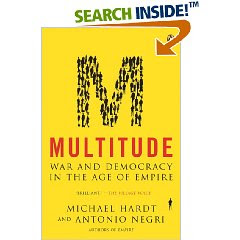
It's being accused of being "neo-Marxist."
And this complaint only endears it to me:
While Hardt & Negri clearly find extended allusions to Jewish mysticism – and later vampires, demons, and carnival – helpful to our understanding of globalisation, many of these vignettes seem more like testaments to the authors’ intellectual creativity (and literary training) than the building-blocks of an argument.
Multitude is a sprawling, often silly book, yet its central point comes out largely right.
Could it be that a more positive reviewer's spin: "perhaps the most important piece of global analysis since Tariq Ali’s Clash of Fundamentalisms" is also right?
"...the somewhat unlikely duo: Hardt, an American political scientist at Duke University, and Negri, a former Italian parliament member and political exile, trained political scientist and sometime inmate of Rome's Rebibbia prison." (link)/
The book?
"Multitude: War and Democracy in the Age of Empire"
by Michael Hardt and Antonio Negri."
I helped officiate a funeral a few days after 9/11 for a woman who died the morning of 9/11; starting my comments with "On Tuesday morning, when World War III broke out..."
Multitude re-imagines the proletariat as a heterogeneous web of workers, migrants, social movements, and non-governmental organisations – “potentially … all the diverse figures of social production”, “the living alternative that grows within Empire.” Where Empire focused on the problems of globalisation, Multitude proposes a solution to those problems – the creation of a truly pluralistic democracy for all mankind.
Multitude does not lend itself easily to summary, but the basic idea is as follows. The multitude is not “the people,” but rather many peoples acting in networked concert. Because of its plurality, its “innumerable internal differences”, the multitude contains the genus of true democracy. At the same time, the multitude’s ability to communicate and collaborate – often through the very capitalist networks that oppress it – allows it to produce a common body of knowledge and ideas (“the common”) that can serve as a platform for democratic resistance to Empire.
The multitude’s democratic potential thus springs from its heterogeneity and its penchant for dynamic exchange. Hardt & Negri believe these characteristics grow from the very nature of contemporary social life and economic production, which they see resting on two pillars. The first is a new model of labour, which Hardt & Negri describe as “biopolitical production.” This unhelpful label tries to capture the particular dynamic of the production of “ideas, images, affects and relationships” in the information economy. These are immaterial rather than material goods. They can spread quickly throughout the world, creating a “common” that touches on all aspects of social life.
The second pillar is the mode of political organisation embraced by the multitude. In place of “centralised forms of revolutionary dictatorship and command,” the multitude organises resistance to globalisation through networks, which substitute “collaborative relationships” for hierarchical authority. At last, a true revolution from below; a movement that can marry the spontaneity of anarchy with the power of mass resistance. Woodstock meets the Internet.
link
The attacks..on September 11...did not change or fundamentally create this global situation, but perhaps they did force us to recognize its generality. There is no escaping the state of war within Empire; and there is no end to it in sight. The situation is obviously already mature. Just as the 'defenestration of Prague' on May 13, 1618, when two regents from the Holy Roman Empire were thrown from the window of the Harcaby castle, ignited the Thirty Yeasrs War, the attacks on Sepetmeber 11 ignited a new era of war. Back then the Catholics and Protestants massacred each other (but soon the sides became confused), and today Christians seem to be pitted against Msulims (although the sides are already confused). This air of a war of religion only masks the profound historical transfirmation, the opening of a new era. In the seventeent century, it was the passage in Europe from modernity, an today the new era is the global passage from modernity to postmodernity.(page 4)
And I'm only on page four, but have peeked at the excurus-midrash on the on the golem/Gollum midrash on page ten. One must at least ask:
Could it be that"The golem-world is not a passing phase but a 'new
ontology.'"
Thank God for Dollar Tree.


